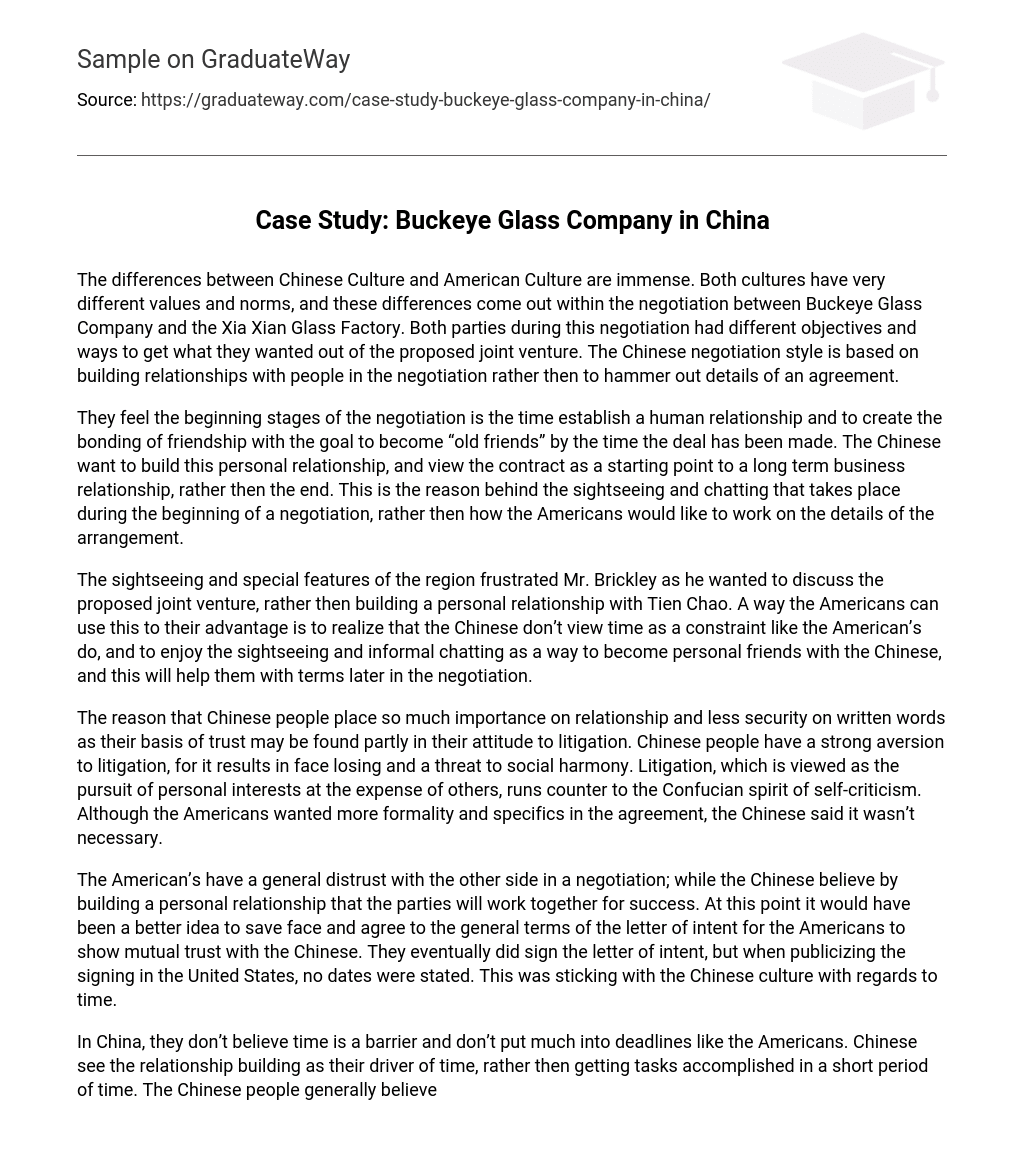The Chinese and American cultures are remarkably distinct in terms of values and norms, as evidenced by the negotiation between Buckeye Glass Company and the Xia Xian Glass Factory. This negotiation showcased the differing objectives and strategies employed by both parties in pursuit of their desired outcomes for the proposed joint venture. Notably, the Chinese negotiation style prioritizes relationship-building over the specific details of an agreement.
The Chinese believe that it is crucial to establish a personal connection and cultivate a friendship during the initial stages of a negotiation. Their aim is to develop a long-lasting business relationship, considering the contract as just the beginning rather than the final outcome. This is why they engage in activities like sightseeing and conversation at the start of negotiations, in contrast to the American preference for focusing on the specific details of the agreement.
Mr. Brickley was disappointed by the sightseeing and unique aspects of the region because he preferred to focus on discussing the proposed joint venture, instead of building a personal relationship with Tien Chao. However, Americans can exploit this situation by recognizing that the Chinese do not perceive time as a constraint like Americans do. They can take advantage of the sightseeing and casual conversations to establish personal friendships with the Chinese, which will benefit them during subsequent negotiations.
Chinese people value relationships highly and place less importance on written agreements as a source of trust. This may stem from their aversion to litigation, which is seen as damaging one’s reputation and disrupting social harmony. Litigation, viewed as prioritizing personal gain over others, contradicts the Confucian principle of self-reflection. Even though the Americans desired a more formal and detailed agreement, the Chinese saw it as unnecessary.
Both Americans and Chinese approach negotiations differently. The Americans tend to have a general distrust towards the other party, while the Chinese are more inclined to believe that a strong personal relationship will ensure cooperation and success. In order to demonstrate mutual trust and save face, it would have been advisable for the Americans to agree to the general terms of the letter of intent. Eventually, they did sign the letter but chose not to mention any specific dates when publicizing the signing in the United States, aligning with the Chinese emphasis on respecting cultural notions of time.
In China, time is not seen as a hindrance and deadlines are not given much importance compared to Americans. Chinese prioritize building relationships and see it as the key factor in managing time, rather than completing tasks quickly. They believe that it is crucial to invest a significant amount of time in establishing a climate of understanding, trust, and willingness to help, which goes beyond the specific business matters. Consequently, achieving a satisfactory agreement in the shortest time possible is not a major focus for them.
Therefore, the non-task sounding stage of negotiation often requires significant time devoted to rapport-building and getting acquainted with partners. This approach initially frustrated the Americans during the negotiation process, particularly when Mr. Brickley was considering the expenses associated with the trip to China. Instead of worrying about the lengthy process and cost of the trip, he would have been better off focusing on establishing a personal relationship with the Chinese. Learning each other’s language could also provide an advantage in the negotiation.
By allowing each side to directly communicate and understand the message being conveyed, reliance on interpretation from others can be minimized. For example, during negotiations, the Chinese could have easily asked Mr. Brickley’s team directly about concessions instead of relying on the American interpreter. Open communication lines and understanding facilitate a smoother negotiation process for both sides.
China and the United States possess contrasting cultures and business approaches. Americans are characterized by their directness, distrust, and adherence to a strict view of time, influencing their negotiation style. Conversely, the Chinese exhibit opposite traits in each aspect. In China, establishing a personal relationship serves as the pivotal element in negotiations. Americans should have prioritized forging friendships from the beginning instead of becoming disheartened by cultural and attitudinal disparities.





